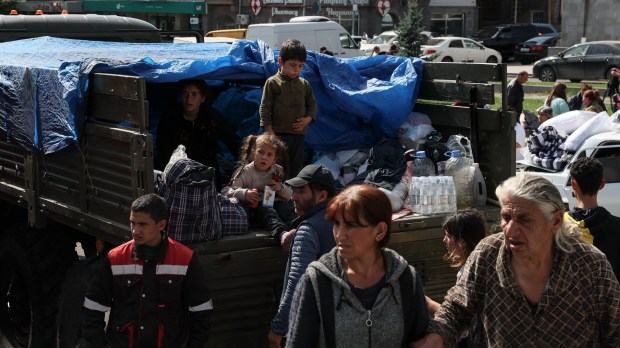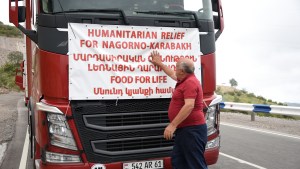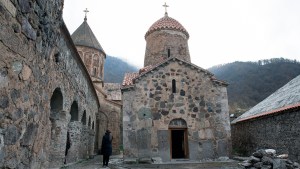A Christian enclave in the Caucasus is about to come to an end, as thousands of Armenians flee Nagorno-Karabakh. The self-declared Republic of Artsakh (Nagorno-Karabakh) was annexed last week by the country that surrounds it, Azerbaijan. Azerbaijan has taken control of the territory where Armenians have lived for more than a millennium.
As an exodus of refugees floods into Armenia, that nation’s Prime Minister, Nikol Pashinyan, said that in the end he does not expect any Armenians to be left in Nagorno-Karabakh.
Pashinyan claimed that forces of mainly Muslim Azerbaijan have engaged in ethnic cleansing of Nagorno-Karabakh’s 120,000 ethnic Armenians. About half of them have fled the country so far.
“Although they are promising to protect the Armenian population, no one believes them,” Dr. Tom Catena, medical director of Mother of Mercy Hospital in the Nuba Mountains of Sudan, told Aleteia.
Dr. Catena has followed events in the region since he won the Aurora Prize for Awakening Humanity in 2017. The prize was initiated in 2015 on behalf of the survivors of the Armenian Genocide.
A US native, Dr. Catena was one of the Aurora laureates and others who signed a September 29 letter condemning Azerbaijan’s arrest on Wednesday of Ruben Vardanyan, who headed the separatist government of Artsakh from November 2022 until February. Vardanyan, a co-founder of the Aurora Prize for Awakening Humanity, has been charged with financing terrorism.
“I’ve gotten to know Ruben over the past six years and can attest to his fine character and multitude of good deeds,” Catena told Aleteia. “Azerbaijan starts teaching hatred of Armenians from primary school, so they are putting out plenty of nonsense about Ruben.”
Call for observers
Western governments have urged Azerbaijan to allow international observers into Nagorno-Karabakh to monitor its treatment of the local population, but access has not yet been given, according to Vatican News.
Vatican News also reported that the Azeri assault on the enclave resulted in destruction or damage to residential homes and a school.
“They were bombing us hard. Children ran into the school,” said a witness. “The Azerbaijan then attacked the school using a mortar gun. Our children were injured there.”
Noticeably absent from the scene was Russia. The New York Times pointed out that Russia, Armenia’s traditional protector and ally since 1992 in a Moscow-led collective security organization, sent peacekeepers to the area in 2020 and promised to keep open the only road linking the enclave to Armenia.
“But Moscow, distracted by its war in Ukraine and eager for closer economic and political ties with Azerbaijan and its ally Turkey, did not intervene this year when Azerbaijan closed that route, cutting off supplies of food, fuel, and medicine,” The Times said. “The Kremlin ordered its peacekeepers to stand aside during last week’s lightning assault on Artsakh’s thin defenses.”
The letter signed by Aurora laureates, who include former presidents Oscar Arias of Costa Rica, Mary Robinson of Ireland, and Ernesto Zedillo of Mexico, called the arrest of Vardanyan “both outrageous and politically motivated.”
The Aurora Humanitarian Initiative seeks to empower modern-day saviors to offer life and hope to those in urgent need of humanitarian aid and to continue the cycle of giving internationally.
“Ruben Vardanyan is being held captive because of his support for the people of Nagorno-Karabakh and their right to a democratic way of life,” said the letter. “The Aurora Humanitarian Initiative to which Ruben has given so much, has for the past eight years honored and supported the work of those who fight for basic human rights, often at the risk of their own lives, all around the world. The irony is that Ruben now finds himself a victim of the same persecution as those he has sought to help as a human rights defender.”



